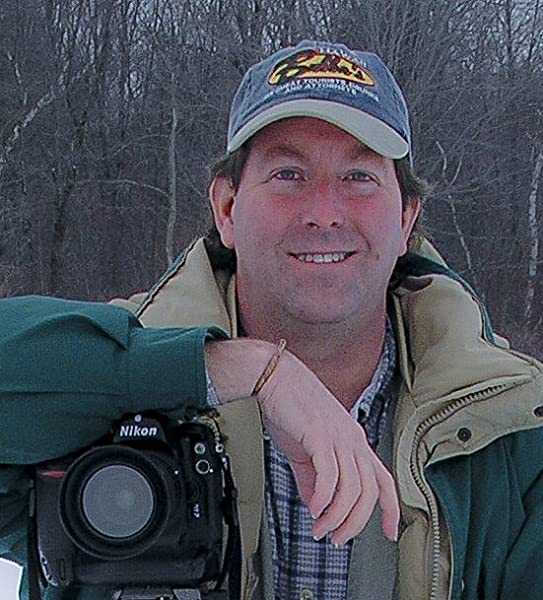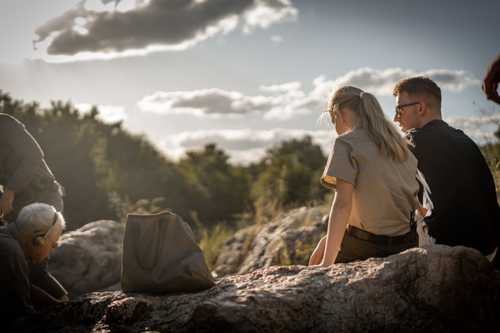
As a field recordist who strives to capture the voice of the natural world, I’m often bemused by the efforts of others to put into words what they’re feeling as they listen to a particularly poignant track. I include myself in that, by the way, which is why I was gobsmacked recently when South African filmmaker Brett Wesley de Groot told me, “A dawn chorus is a sunrise for a blind person.”
Rarely have I heard such a profound description of such a sublime moment. Brett had joined me on my Podcast, “The Natural Curiosity Project,” to take part in an interview I was doing with Sarah and Derek Solomon, a South African couple who for many years have operated a safari company for visitors who want to see South African wildlife in its natural setting. But somewhere along the way, their business model shifted ever so slightly.
“We’ve been wildlife photographers for many years,” Derek told me, “And while Sarah and I love to see the wildlife, we also love the sounds they make, which are every bit a part of the experience as seeing them. I love wildlife photography, but for many years I have also been a passionate wildlife sound recordist (you can listen to Derek’s work at DerekSolomon). So, we decided to start doing sound safaris, as well.”
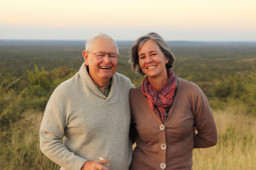
Their technique is ingenious. They mounted a focused stereo microphone array on the front of their safari vehicle, and installed headphone jacks and headphones for all guests in the seats of the vehicle. Then, they’d head out, usually at dawn and dusk.
“It’s quite amazing,” Sarah told me. “We drive down the track in the darkness, and when we spot signs of wildlife, we stop the vehicle, turn off the lights, and ask the guests to be very quiet and put on their headphones and just listen. Their response is wonderful to watch. We often ask them to tell us what they think they’re hearing, it’s not as easy as it sounds. ‘Growling lion,’ they say, with confidence. Nope—ostriches, or sometimes elephants rumbling.”
During my professional career, I worked extensively in Africa for many years and have had the great pleasure of going on safari many, many times. It’s a life-changing experience, but for the most part, the trips have always been about wildlife photography. Once I started doing sound as well, the experience took on a whole new dimension.
But somewhere along the way, Sarah and Derek had another idea, a safari experience that was profoundly different.
I asked Derek to describe it.
“We’re repeating what we do on a normal sound safari, but now, we’re taking visually impaired people out to give them a chance to get into the bush and experience a safari. Up until now, there’s been no way for them to really do that – where the whole safari is specifically developed for them. We have the same safari vehicle, and off we go, with a total focus on sound.”
But the experience, as it turns out, isn’t limited to sound.
“We also bring in other elements,” says Derek. “Touch, smell, and taste.
“We might stop, for example, at a rhino rubbing post and let the guests feel it. If we find an elephant rubbing post on a tree where the animals have walked past and scraped the mud off and had a good scratch, our participants can go and feel that. And that gives them an idea of the height of the elephant, because otherwise they’d have no idea how really big these creatures are. We’ll go and play in the mud and let them touch footprints and get a feel of what an antelope footprint is like compared to an elephant footprint.
“Then, we’ll pick up the smells of the bush if any flowers are out. And we’ll collect marula fruits and sour wild plums and have them taste them. It’s a complete sensory experience.”
It was a complicated process to develop,” says Sarah. “We were thinking about ways to promote the experience, and we started off with the Guide Dog Association because they were very enthusiastic about it. And then, while we were thinking about all of this, and trying to build a model that would work, Brett contacted us and asked us to run a sound safari for a young blind South African girl.”
What happened next was a turning point in all of their lives.
“My career,” Brett told me, “Started off in musical theater. One night, during a performance, the front row of the audience was filled by a group of people who never clapped. For performers, this is the most bizarre thing: they weren’t clapping; they just sat there.
“But then we noticed that they all had their shoes off—it was the strangest thing. But it wasn’t, really. They were members of a deaf theater club, and they came to watch the musical. They took their shoes off and rested their feet against the monitors. They felt the vibration of the music through the monitors, and what they later explained was that if you sing something that is technically proficient or beautiful or high, the vibration is equally pleasing, and they can understand the proficiency and the professionalism and the incredibleness of that note, just by feeling the vibration.
“So, that experience stayed with me. As people who are fully equipped with our five senses, we take it for granted that we need all five of them to experience the world. But in fact, we can have just as fulfilling an experience, even if we’re missing one or more of them, as we soon discovered in a rather profound way.”
At roughly the same time, Brett got the opportunity to submit a proposal for the largest film festival on the African continent. He had an idea for a short documentary that he wanted to shoot, and at about the same time, he heard about Derek and Sarah’s company and what they were doing with their sound safaris. All the parts, Brett realized, were falling into place.
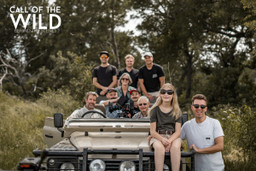
“Brett contacted us about his film idea,” Derek told me, “And explained what he wanted to do with us. But he was also quick to say that he didn’t think he’d make it all the way through the selection process.”
He entered two pitches in the contest, and watched as the herd of potential winners was winnowed from 2000 entries to 50 to the top 20, one of which was him. He reached out to Derek and Sarah and told them that he had a small chance of winning. Luckily, they were still on-board ad willing to work with him, if he did win.
Brett laughed and shook his head. “We made it to the top ten with both pitches. And then I had to pitch against myself since I had two film proposals entered, which was quite a bizarre process in itself, and they then told me that I would have a place in the top six—and that six documentaries would get made!
“But there was a catch: I had to find a blind person to feature in the film; I had a week to do it; and the protagonist had to be a child. No pressure!”
But, he managed. Brett contacted an ocularist who makes prosthetics for children born without eyes, explained the bind he was in, and asked the ocularist if he had anyone who might be willing to play a role in the film. After careful consideration, the specialist gave Brett a number to call—the number that ultimately changed the face of the documentary.
“In the beginning,” Brett told me, “The documentary was almost exclusively about what Derek and Sarah were doing. But the theme shifted when we met the most incredible young woman.
But: Fast-forward to today. Anika, now 15 years old and the star of the documentary, was born without eyes because of a rare genetic condition. But if you’re feeling pity for her, set it aside. Anika is tri-lingual; she swims like a fish; and she owns her own catering company. In fact, she is every bit as independent as most people with normal vision.
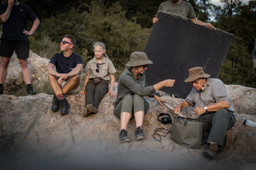
Making a film is a complicated undertaking, but one important element turned out to be far less complicated than Brett thought it would be. In fact, he walked away with an important personal lesson: He came to understand that when working with someone who has a disability, any pity felt because of the person’s disability is a wasted emotion.
“You know, the very first thing that happened on set was that Anika walked in, and the crew gathered around to help her. This was a movie set, after all, and there were all kinds of tripping hazards about. Her adoptive parents immediately stopped us, and they said, ‘no-no-no-no—she doesn’t need any of that.’
“Of course, we were quite taken aback, as you can imagine. ‘But what if she falls?’ we asked. ‘Then she’ll get up,’ they replied.
“And in fact, she was fine throughout the entire shoot.”
But being on set and being in the bush are two very different things.
“Something that we noticed immediately,” Brett told me, “Is she had no fear. That was a big stressor for all of us. Derek and Sarah hadn’t taken a blind person on one of these safaris before, so they had serious concerns about how she was going to react to the experience. This was something that we discussed early on: does she understand what an elephant is? Does she understand how big it is? But something came across quite clearly, once we saw Anika in the bush, interacting with the environment: a blind person can appreciate size through sound just as well as a fully sighted person can through sight. So yes, she understood the immensity of the creature, and knew to respect it, but there was no fear. We all learned from that.”
“A dawn chorus is a sunrise for a blind person.” That is one of the most powerful statements I’ve heard in a very long time.
To learn more about the safaris, both photographic and sound-based, that Sarah and Derek offer, or to purchase some of the most beautiful and evocative wildlife sounds and soundscapes you will ever hear, please visit DerekSolomon.com.
As for Brett’s film, “Call of the Wild,” it will enter the International Film Festival circuit in the latter half of 2024, starting with the Amsterdam Film Festival as its European premiere and the New York Film Festival as its debut in the states. After that, it will be widely available for streaming.
🎧 Don’t miss this follow-up interview with Sarah and Derek Solomon about their sound safaris for the visually impaired.
Featured photo by Ben-Nathan Ras: Anika and Brett during the filming of “Call of the Wild”
Earth.fm is a completely free streaming service of 1000+ nature sounds from around the world, offering natural soundscapes and guided meditations for people who wish to listen to nature, relax, and become more connected. Launched in 2022, Earth.fm is a non-profit and a 1% for the Planet Environmental Partner.
Check out our recordings of nature ambience from sound recordists and artists spanning the globe, our thematic playlists of immersive soundscapes and our Wind Is the Original Radio podcast.
You can join the Earth.fm family by signing up for our newsletter of weekly inspiration for your precious ears, or become a member to enjoy the extra Earth.fm features and goodies and support us on our mission.
Subscription fees contribute to growing our library of authentic nature sounds, research into topics like noise pollution and the connection between nature and mental wellbeing, as well as funding grants that support emerging nature sound recordists from underprivileged communities.

